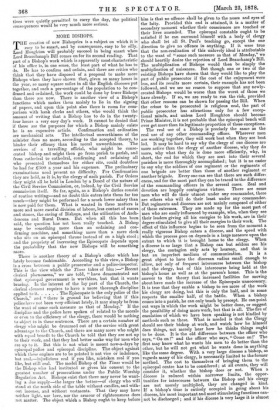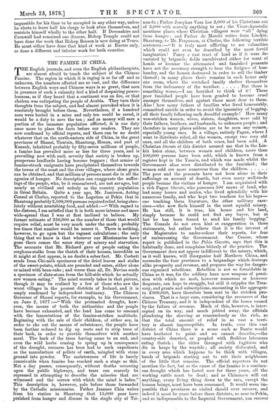MORE BISHOPS. T HE creation of new Bishoprics is a subject
on which it is easy to be smart, and by consequence, easy to be silly. Lord Houghton will probably succeed in being smart when Lord Beauchamp's Bill comes on for its second reading. That part of a Bishop's work which is apparently most characteristic of his office is, in one sense, the least part of what he has to do. He has to confirm and ordain, and there are critics who think that they have disposed of a proposal to make more Bishops when they have shown that, given so many hours in the year, so many square miles in all the English dioceses put together, and such a per-centage of the population to be con- firmed and ordained, the work could be done by fewer Bishops than there are now. There is another view of a Bishop's functions which makes them mainly to lie in the signing of papers, and upon this point also there is room for com- parison with bank clerks and others, who would think the amount of writing that a Bishop has to do in the twenty- four hours a very easy day's work. It cannot be denied that if these are the purposes for which a Bishop mainly exists he is an expensive article. Confirmation and ordination are mechanical acts. The intellectual unworthiness of the minister does no more, according to the accepted theory, to hinder their efficacy than his moral unworthiness. The services of a travelling official, who might be conse- crated bishop and might then go from parish to parish, and from cathedral to cathedral, confirming and ordaining all who presented themselves for either rite, could doubtless be had for £300 a year and his expenses. The preliminary examinations need present no difficulty. For Confirmation they are held, as it is, by the clergy of each parish. For Orders they might all be held in London by a Board of the nature of the Civil Service Commission, or, indeed, by the Civil Service commission itself. So far, again, as a Bishop's duties consist of routine writing—and no doubt this enters into them far too much—they might be performed for a much lower salary than is now paid for them. What is wanted in these matters is more and more careful division of labour, less contact of razors and stones, the saving of Bishops, and the utilisation of Arch- deacons and Rural Deans. But when all this has been said, the question has not been really touched. A Bishop may be something more than an ordaining and con- firming machine, and something more than a mere clerk who sits on an episcopal throne instead of on a high stool ; and the propriety of increasing the Episcopate depends upon the probability that the new Bishops will be something more.
There is another theory of a Bishop's office which has lately become fashionable. According to this view, a Bishop is a cross between a public prosecutor and a police-inspector. This is the view which the Times takes of him :—" Recent clerical phenomena," we are told, " have demonstrated not that episcopal government is worthless, but that it wants bracing. In the interest of the lay part of the Church, the clerical element requires to have a more thorough discipline applied to it The Episcopate is the only police of the Church," and " there is ground for believing that if this police have not been very efficient lately, it may simply be from the want of some such measure as that of Monday." If the discipline and the police here spoken of related to the morale or even to the efficiency of the clergy, there would be nothing to object to in these sentences. There are a certain number of clergy who might be drummed out of the service with great advantage to the Church, and there are many more who might with equal benefit to the Church be told that they are not up to their work, and that they had better make way for men who are up to it. But this is not what is meant now-a-days by episcopal police and episcopal discipline. The object against which these engines are to be pointed is not vice or indolence, but zeal,—injudicious zeal if you like, mistaken zeal if you like, but still zeal. The model Bishop of the Times would be the Bishop who had instituted or given his consent to the greatest number of prosecutions under the Public Worship Regulation Act. Bishops exist that there may never be want- ing a due supply—the larger the better—of clergy who will stand at the north side of the table without candles, and with- out incense, and without vestments. That they may have neither light, nor love, nor the armour of righteousness does not matter. The object which a Bishop ought to keep before him is that no offence shall be given to the noses and eyes of the laity. Provided this end is attained, it is a matter of secondary moment whether their consciences are touched or their lives amended.. The episcopal constable ought to be satisfied if he can surround himself with a body of clergy who shall let all St. Paul's teaching go, except the one direction to give no offence in anything. If it were true that the non-realisation of this unlovely ideal is attributable to the want of " some such measure as that of Monday," we should heartily desire the rejection of Lord Beauchamp's Bill. The multiplication of Bishops would then be simply the multiplication of nuisances. But though one or two of the existing Bishops have shown that they would like to play the part of public prosecutor if the cost of the enjoyment were less, and its results more certain, their example has not been followed, and we see no reason to suppose that any newly- created Bishops would be worse than the worst of those we have already. If so, we are ready to run the risk, provided that other reasons can be shown for passing the Bill. When the crime to be prosecuted is religious zeal, the part of public prosecutor has attractions only for a few excep- tional minds, and unless Lord Houghton should become Prime Minister, it is not probable that the episcopal bench will ever get more than its legitimate proportion of these exceptions.
The real use of a Bishop is precisely the same as the real use of any other commanding officer. Wherever men are working together, they will work best when they are best led. It may be hard to say why the clergy of one diocese are more active than the clergy of another diocese, why they do more, why what they do is done more efficiently, why, in short, the end for which they are sent into their several parishes is more thoroughly accomplished ; but it is no easier to say why the soldiers of one regiment or the regiments of one brigade are better than those of another regiment or another brigade. Every one can see that there are such differ- ences, and for the most part they can be traced to the difference of the commanding officers in the several cases. Zeal and devotion are happily contagious virtues. There are some men who will do their utmost under any commander, there are others who will do their least under any commander. But regiments and dioceses are not mainly composed of either of these extremes. They are made up for the most part of men who are easily influenced by example, who, when they see their leaders giving all his energies to his work, are in their degree stimulated to give all their energies to their work. The effect of this influence begins to be seen from the moment a really vigorous Bishop enters a diocese, and the speed with which the process goes on depends in a large measure upon the extent to which it is brought home to the clergy. When a diocese is so large that a Bishop can but seldom see his clergy, the contagion only acts by hearsay, and that is but an imperfect medium of communication. It is a great object to have the diocesan radius small enough to allow, not only of frequent intercourse between the bishop and the clergy, but of this intercourse being held at the bishop's home as well as at the parson's home. This is the answer to the theory that increased facilities for moving about have made the increase of the Episcopate unnecessary. It is true that they enable a bishop to see more of the work his clergy are doing, but this is only the half, and in some respects the smaller half, of the battle. When a bishop comes into a parish, he can only teach by precept. He can point out ways in which the work might be better done, or suggest the possibility of doing more work, but that is all. The fire of emulation of which we have been speaking is not kindled by methods such as these. What is needed is that the Clergy should see their bishop at work, and watch how he himself does things, not merely hear how he thinks things ought- to be done. It is the old difference between the officer who says, " Go on 1" and the officer who says, " Come on I' The first may know what he wants his men to do better than the other, but he will not get what he wants done in anything like the same degree. With a very large diocese a bishop, as regards many of his clergy, is necessarily limited to the former method. The cost to themselves of bringing them to the episcopal centre has to be considered ; at all events, they will consider it, whether the bishop does or not. When a diocese is reduced within narrower limits, the oppor- tunities for intercourse between the Bishop and his clergy are not merely multiplied, they are changed in kind. If a bishop's time is entirely occupied in going about his diocese, his most important and most stimulating functions can- not be discharged ; and if his diocese is very large it is almost impossible for his time to be occupied in any other way, unless he elects to leave half his clergy to look after themselves, and restricts himself wholly to the other half. If Devonshire and Cornwall had remained one diocese, Bishop Temple could not have done the work that Bishop Benson is now doing at Truro. He must either have done that kind of work at Exeter only, or done a different and inferior work for both counties.



































 Previous page
Previous page